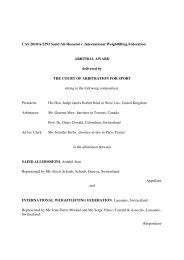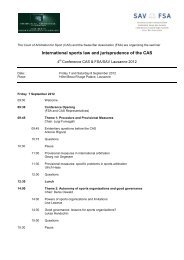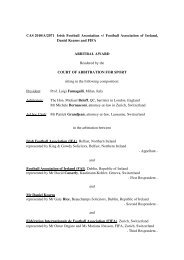(CAS) Bulletin - Tribunal Arbitral du Sport / TAS
(CAS) Bulletin - Tribunal Arbitral du Sport / TAS
(CAS) Bulletin - Tribunal Arbitral du Sport / TAS
Create successful ePaper yourself
Turn your PDF publications into a flip-book with our unique Google optimized e-Paper software.
players were the national federations, it would not be<br />
possible to achieve equality.<br />
It appears that UEFA was allowed to review the<br />
qualifi cation of the players registered by their club<br />
to participate in the UEL 2011/2012. In view of<br />
the hundreds of players qualifi ed it seems obvious<br />
that UEFA cannot review the qualifi cation of each<br />
player. Therefore, the acceptance of the list with the<br />
registered players fi led by the clubs cannot be seen as<br />
recognition that the players were validly qualifi ed. The<br />
acceptance of the list is simply the acknowledgment<br />
that the submission was made in the form required.<br />
However, through the possibility offered to the<br />
clubs to fi le a protest in case a player’s qualifi cation<br />
is disputed, UEFA can verify whether the player is<br />
qualifi ed or not. This proce<strong>du</strong>re guarantees a fair<br />
and equal application of the FIFA Regulations with<br />
regard to the qualifi cation of players taking part in<br />
the UEL 2011/2012.<br />
The Panel notes that the possibility to fi le protests in<br />
relation to player-eligibility according to Article 23<br />
and 24 of the UEL Regulations is a strong indication<br />
for admitting UEFA’s right to review the players’<br />
qualifi cation. As a matter of fact a club can protest<br />
against a player’s qualifi cation only after knowing<br />
the names of the players fi elded by the opponent<br />
club, hence after transmission of the players’ list<br />
of the opponent club. Was the acceptance of the<br />
players’ list already to constitute a fi nal decision on<br />
eligibility to play, the provisions of Articles 23 et seq.<br />
UEL Regulations would no longer be applicable as<br />
the decision which was taken could no longer be<br />
changed, even if an opposing club were to lodge a<br />
protest.<br />
As an interim conclusion, it must therefore be noted<br />
that Article 18.06 of the UEL Regulations is to be<br />
interpreted in the sense that UEFA is entitled to<br />
decide on the eligibility of players. The argument<br />
put forward by OLA according to which the letter of<br />
17 August 2011 constitutes a formal decision is not<br />
convincing as the acceptance of the list of players is<br />
not a decision pursuant to Article 18.06 of the UEL<br />
Regulations. The list merely serves to indicate the<br />
names of the players to be forwarded to the opponent<br />
club.<br />
In addition, UEFA expressly stated in its letter of 17<br />
August 2011 that no decision on the Players’ eligibility<br />
had been taken and that, if the Players were ineligible,<br />
the sanction mechanism would apply. The following<br />
statement was contained in this letter:<br />
“Would it appear that players have been deemed as eligible<br />
while their situation was in fact irregular, UEFA would<br />
certainly take appropriate steps against them and their club”.<br />
The letter of 17 August 2011 clearly shows that<br />
UEFA reserves the right to take legal action should it<br />
transpire that the Players are not eligible.<br />
Based on the above, the Panel concluded that OLA<br />
cannot derive any arguments in its own favour from<br />
the letter of 17 August 2011.<br />
2.1.2 Competence of FIFA or of UEFA<br />
OLA takes the view that under the applicable<br />
regulations only the national associations are<br />
authorized to decide whether players are eligible to<br />
play. It submits that it is within the competence of<br />
FIFA to decide on the eligibility of the players.<br />
OLA submits that UEFA must abide the decision<br />
taken by a national association granting permission<br />
to play and cannot deviate from that decision. As the<br />
players were authorized to play by the SFL/SFA, it<br />
believes that UEFA is bound by that decision.<br />
However, it must be noted that Articles 18.01<br />
and 18.02 of the UEL Regulations provide that<br />
registration, with a national federation, in accordance<br />
with the federation’s own rules and those of FIFA, is<br />
one of the conditions for the players’ eligibility.<br />
In the case at hand, the Players had been provisionally<br />
registered by SFL based on the ex-parte interim<br />
measures ordered by the District Court of Martigny<br />
and St-Maurice on 3 August 2011, which were<br />
directed against FIFA and SFA/SFL. Similar requests<br />
directed against UEFA were rejected.<br />
If a third federation, such as the SFL/SFA,<br />
(provisionally) authorises a player to play on the basis<br />
of a court order, UEFA is indeed not bound by such<br />
authorization. The UEL Regulations provide that a<br />
player is eligible to play and must be registered with<br />
the association concerned on the basis of its own<br />
provisions and those of FIFA. However, the Panel<br />
notes that the SFL registered the Players only based<br />
on the court order on provisional measures.<br />
Moreover, the Panel’s interpretation of the applicable<br />
rules complies with sports criteria, i.e. to establish<br />
uniform regulations applicable equally to all clubs.<br />
In order to guarantee equality of the competitors,<br />
UEFA must be able to rev iew the decisions of other<br />
organisations.<br />
Jurisprudence majeure / Leading cases<br />
-<br />
193





